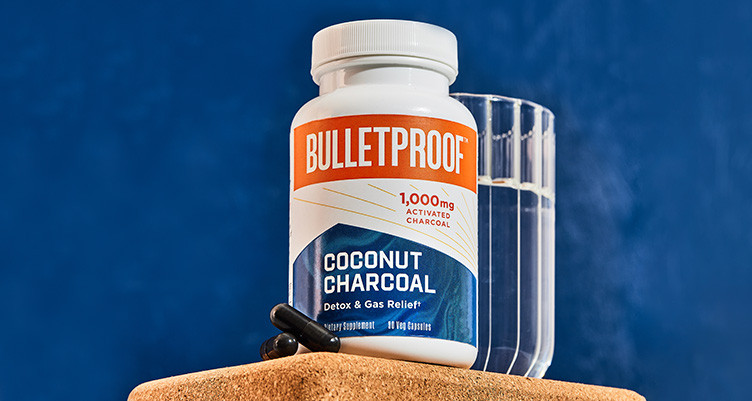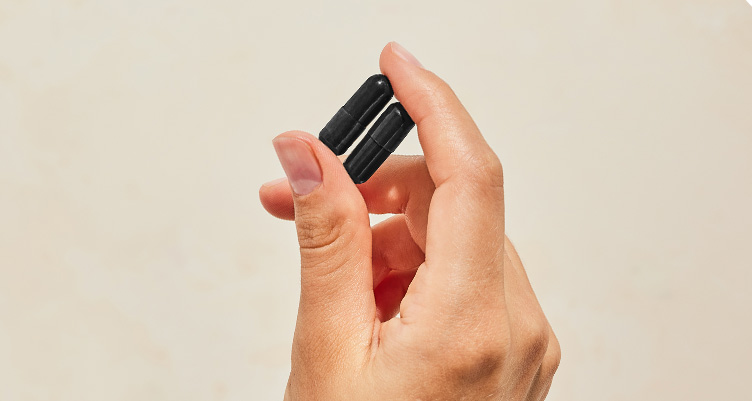What Is Activated Charcoal? Understand The Benefits & Side Effects

- An activated charcoal supplement can aid in the detoxification process and also help counteract gas-related bloating.
- You should never take activated charcoal with supplements or medications, as it can bind to other substances.
- Bulletproof Coconut Charcoal is in an activated form, 100% sourced from coconuts, free of fillers and provides gastrointestinal relief in a convenient capsule form.
For thousands of years, activated charcoal has been used to help detoxify the body. Today, it can help offset the discomfort that comes after eating foods that cause gas and bloating.
But what does activated charcoal do once it’s in your GI tract? According to research, it binds with certain heavy metals and everyday toxins to help flush them from the GI tract.[1]
Ultimately, activated charcoal reduces gas and bloating after eating, and it can also be part of an overall detoxification diet or routine.
Read on to learn about activated charcoal benefits, potential side effects and where to buy activated charcoal.
What is activated charcoal?

Activated charcoal is the byproduct of burning a carbon source like wood or coconut shells, the latter of which is our preferred source. The carbon is “activated” by high temperatures that change its chemical structure, creating smaller particles with more surface area. The result is ultra-fine charcoal with millions of tiny pores that bind many heavy metals, everyday toxins and intestinal gases, helping to remove them from the gastrointestinal tract (and prevent them from entering the bloodstream).[2] One teaspoon of activated charcoal has about the same total surface area as a football field.[3]
Why use activated charcoal?
Charcoal has been consumed for centuries as a versatile remedy. In the early 19th century, medical journals began publishing research revealing activated charcoal as an antidote for poisons. It works through a process called “adsorption” (adsorption, not absorption), which means “to bind to” rather than “to absorb.”[4]
Over the years, activated charcoal has become a popular supplement. After all, with processed foods more readily available than ever, many people need help cleansing their systems of impurities and everyday toxins.
Activated charcoal can be an effective solution to counteract bloating and other unwanted side effects from overindulging. It systematically supports the elimination of everyday toxins, which can provide you with much-needed relief in the event you didn’t make the best food choices.
Benefits of activated charcoal

When it comes to activated charcoal benefits, there are several reasons why you should consider keeping this supplement on hand.
What is activated charcoal’s role in your daily life? Here are just a few ways activated charcoal works in supplement form to support your health:
1. General detoxification
Everyday toxins from low-quality, processed food and environmental pollution negatively impact your energy and contribute to brain fog and digestive issues.[5][6] Regular use of charcoal can remove unwanted everyday toxins from your body so you can feel better, fast.
2. Relief from gas and everyday bloating
After digesting foods like beans, bacteria in your body break down the cellulose, generating some byproducts like gas or liquid stools. Charcoal enters the digestive tract and counteracts this process by binding to those byproducts and easing digestive issues.[7]
3. Binds to toxins
Charcoal was first demonstrated as a poison antidote in the 19th century, when scientists ingested arsenic and strychnine then chased it with activated charcoal. They survived the experience. Modern studies have shown that activated charcoal can make drugs less bioavailable. Initial studies showed that activated charcoal made some drugs less bioavailable and the majority of some drugs cleared the body without being absorbed.[8] This is why you want to take charcoal away from other supplements and medications.
When to use activated charcoal

Now that you know the potential health benefits of activated charcoal, it’s time to learn when to use it. Although it may have started as a form of poison control, there are more common instances when taking activated charcoal can offer benefits:
- Eating out at restaurants: When dining out, you have less control over the ingredients used in dishes, and certain ones may not sit well with your digestive system. Take activated charcoal to help counteract bloating and intestinal gas issues.
- Consuming processed foods: Ingesting processed foods isn’t the best way to take care of your body. But if you do choose to eat them on occasion, you can take activated charcoal to help detoxify your system and mitigate any digestive discomforts.
- Drinking low-quality coffee: Some coffees have everyday toxins. The detoxifying effect of activated charcoal can be handy if you sip an unfavorable cup.
- Overindulging on party food: Whether it’s the holidays, a birthday or just any type of party, you know there’s going to be delicious food choices. However, holiday and party foods can be rich and heavy, leading to gas, bloating and other discomforts. If you overindulge on occasion, activated charcoal may offer relief.
- When traveling: New foods and even water can lead to indigestion and other discomfort when traveling. Try adding an activated charcoal supplement to your packing list.
While there are times you should take activated charcoal, there are also certain situations where you should not.
When to avoid taking charcoal
Never take activated charcoal with medications or other supplements. Charcoal binds to both harmful and helpful substances—including prescription medications, vitamins and minerals. Taking charcoal at a different time of day than you take other supplements or meds gives it time to pass through your system and not bind to things you want your body to absorb. (That means best practice is to take your activated charcoal supplement away from the ingestion of other vitamin or mineral supplements. Otherwise, it may interfere with their absorption.)
Pro tip: Be sure to seek medical advice about whether charcoal can interfere with your over-the-counter medications or any health issues.
What to look for when buying activated charcoal
When it comes to purchasing an activated charcoal supplement, make sure to do your homework, first. A few things you should keep in mind include:
- Look for pure charcoal made from coconut shells: Unfortunately, other charcoal supplements on the market may contain cheaper and sub-quality materials like wood, peat, bamboo and mixed debris.
- Choose a charcoal that is activated: If the charcoal is activated, it is porous and allows the supplement to do its job. It acts like a sponge as it detoxifies.
- Ensure the supplement is free of fillers: This will ensure the supplement is in its purest form and will not contain other, potentially harmful ingredients.
How to take activated charcoal

Since individuals respond differently to supplements, you should always consult a health professional beforehand. That’s the case with activated carbon (otherwise known as activated charcoal).
What is activated charcoal’s recommended dose? Take 1,000mg of activated charcoal for detoxification purposes. That is only two capsules of our 100% coconut shell-sourced activated coconut charcoal. Pay attention to how you feel after consuming activated charcoal.
As for frequency? While activated charcoal products are convenient for acute situations to counteract bloating or other digestive issues, it isn’t just for isolated incidents. You can absolutely take activated charcoal as needed.
Activated charcoal side effects
If you take too much activated charcoal, your body will let you know. So, what are some potential activated charcoal side effects?
You may experience constipation if you take too much of this popular supplement. If this happens to you, reduce your dosage. In addition, make sure to drink plenty of water, as it will help you maintain regularity.
Take note: Taking activated charcoal may result in black bowel movements. If that is new and unexpected (and only associated with the introduction of the activated charcoal), know that is normal. This experience can help you learn how long food takes to pass through your bowel (called transit time).
Sign up for early access to sales, product launches, the latest Bulletproof news and more!
This article was originally published on December 2, 2020 and has been updated with new content.



